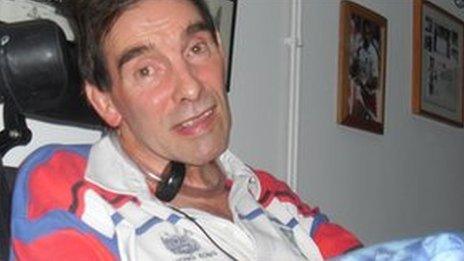Tony Nicklinson: Legacy
- Published

Tony Nicklinson was a husband, a father to two daughters and the man who launched a huge challenge to the law on assisted suicide and murder in England and Wales.
His "right-to-die" case went further than previous cases centred around assisted suicide. Mr Nicklinson wanted somebody to actually kill him without being prosecuted.
He lost his High Court case last week, around the same time he started to refuse food. The life he described as a "living nightmare" came to end on Wednesday.
But despite his failure in the courts, will Tony Nicklinson change the way society views the "right to die"?
Mr Nicklinson's case certainly sparked large amounts of personal sympathy, even from people who disagreed with him ideologically. His despair, captured on film when the High Court decision was announced, gave a moving insight into the torment of a life locked inside your own body.
But can one person sway opinion on "right-to-die" cases - especially when many people have firm views on either sides of the debate?
'Parliament to decide'
The courts acknowledged his circumstances were "deeply moving". However, they were adamant in their judgment that it was not their job to decide if the law on assisted dying should change.
"These are matters for Parliament to decide," Lord Justice Toulson said.
There is no indication that politicians are about to take on the issue.
Should a debate arise it will continue to be opposed on ethical, religious and practical grounds. The people who would be expected to perform euthanasia - doctors - are strongly opposed.
The British Medical Association does not want the law changed. It said "it does not believe that it would be in society's best interests for doctors to be able to legally end a patient's life". Other doctors groups, such as the Royal College of Physicians, share this stance.
One thing is certain though. These cases will keep on coming.
Another man with locked-in syndrome, known only as Martin, who contested his case at the same time as Mr Nicklinson, has announced he will be appealing against the High Court decision.